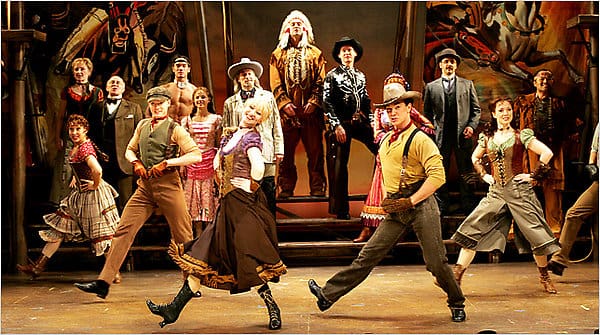Irving Berlin’s musical Annie get Your Gun has been revived more times than all the patients in Trauma: Life in the ER combined. It’s hard to see why. Sure, the feminist angle’s pretty strong. And Ethel Merman made the song “There’s No Business Like Show Business” a major hit. But the musical is pretty mamby pamby—compared to the life of its eponymous inspiration. Annie Oakley was, to coin a phrase, a pistol. The New York Times review of the latest version calls Oakley “a kind of protofeminist.” She was nothing of the sort. She was a crack shot, a well-loved performer and a full-on, no apologies feminist. “Throughout her career, it is believed that Oakley taught upwards of 15,000 women how to use a gun,” the hive mind at Wikipedia reports. “Oakley believed strongly that it was crucial for women to learn how to use a gun, as not only a form of physical and mental exercise, but also to defend themselves . . .
Oakley continued to set records into her 60s, and she also engaged in extensive, albeit quiet, philanthropy for women’s rights and other causes, including the support of specific young women that she knew.
Now there’s a story I’d like to see. As for this play, The New York Times has almost as little time for it as me—and they’ve seen it.
The show feels as if it needs a jolt of energy, and the panel that covers the stage during the intermission points up the problem. Mr. Schweikardt has painted it with the famous scene from “Buffalo Bill’s Wild West” in which Indians ferociously attack a wagon train. Horses are in full gallop, tails and manes flying; a brave reels backward, his rifle in midair; you can practically smell the gunfire and hear the cavalry approaching. That kind of crackling excitement finally arrives onstage when Ms. Gambatese and Mr. Earley join forces for the classic Broadway duet “Anything You Can Do.” But by then, the show is over.
No it isn’t. Yes it is. No it isn’t. Yes it is.




